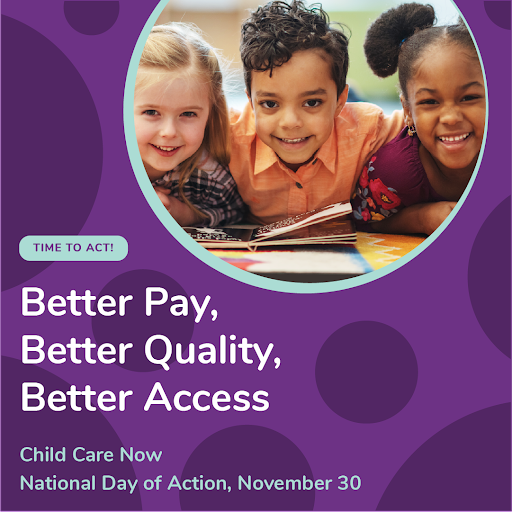December 20, 2022
The Telegram: Op-Ed

In partnership with the NL Federation of Labour, we submitted this op-ed in honour of the National Day of Action on ELCC, co-ordinated by Child Care Now.
Everyone in Newfoundland and Labrador has a childcare story – and usually, it’s about what happens when there aren’t enough spots.
Maybe you’re a grandparent looking after your grandchild a few days every week so that your daughter can go back to work. Maybe you’re an employer seeing employees struggle to balance work and family demands with caring for young children. Maybe you’re a parent who added your child’s name to a waitlist as soon as they were born. Or your community lost a nurse practitioner or doctor because they had young children with special needs, who couldn’t be included at a local childcare centre.
The COVID-19 pandemic made the childcare crisis unavoidable. When schools and childcare centres shut down, so did everything else. More than 1.5 million women lost jobs in the first two months of the pandemic.
As workplaces and services began to reopen, it was difficult for families to get back to work without adequate access to childcare. The burden of that reality fell on women. Women in Canada contribute about 40 per cent of household income. Early Childhood Education (ECE) is key to the economy and economic recovery.
It’s not just about helping parents go back to work. The Health Accord Report and Blueprint, as well as the 2017 Report of the Premier’s Task Force on Educational Outcomes, emphasize the importance of ECE; the kind of developmentally appropriate learning that happens in childcare, for lifelong health and flourishing. This is because skills that children learn through play in childcare – how to collaborate, be empathetic, to listen and to problem-solve – support their learning in kindergarten, throughout school and beyond. Indeed, children who participate in ECE graduate high school at higher rates, and have less need for special education.
In July 2021, the federal and provincial governments acknowledged the critical role ECE plays in our economy by signing an historic deal to invest over $347 million as part of a Canada-wide Early Learning and Child Care System; so families can have access to high-quality, affordable, flexible and inclusive early learning and childcare, no matter where they live. Licensed childcare spots are now just $15 per day, and will drop to $10 per day in January 2023. By 2026, the provincial government has promised 5,800 new childcare spots and full-time pre-kindergarten for all four-year-olds.
However, families in Newfoundland and Labrador still have difficulties accessing childcare, especially in a licensed, regulated childcare setting that costs $15 per day. That is why it is essential to increase childcare capacity in the province and do it promptly without compromising quality.
But until we solve the workforce crisis in ECE, we won’t come close to the goal of providing childcare to every family and ECE to every child. Unlike teachers, Early Childhood Educators do not have a common employer (i.e. school board) and are not usually members of a union. Compensation and working conditions vary, depending on where educators work.
On average, Early Childhood Educators in Canada earn $20 per hour. Often, they do not have paid holidays or sick days. It’s rare if they have health or dental benefits, or retirement plans. Meanwhile, they spend their career caring for and educating young children – which is difficult, skilled and important work.
By investing in Early Childhood Educators, we create good, well-paying, professional jobs in every community in the province. We also support the employment of parents and the well-being of their children. As the provincial and federal governments expand the childcare system, focus must be on educators, and offering working conditions and compensation that reflects their training and expertise.
We all have a role to play in supporting the childcare system and Early Childhood Educators who sustain it. Get to know the Early Childhood Educators at your local childcare centre, and support their work.
ECE is essential to nurture, support and teach our youngest children. Parents – and our economy – can’t work without it.
Submitted on behalf of the NL Child Care Coalition by Neria Aylward, executive director of the Jimmy Pratt Foundation, and Jessica McCormick, president of the Newfoundland and Labrador Federation of Labour